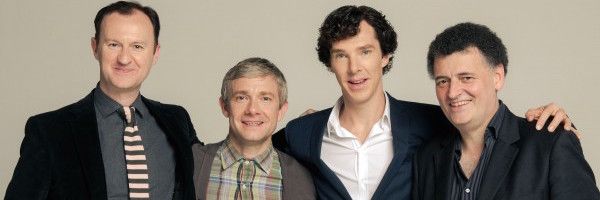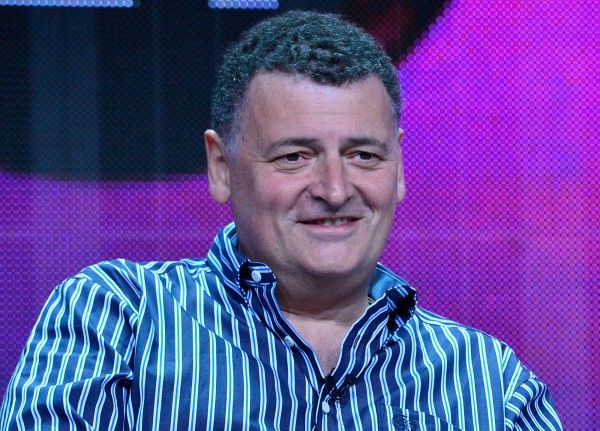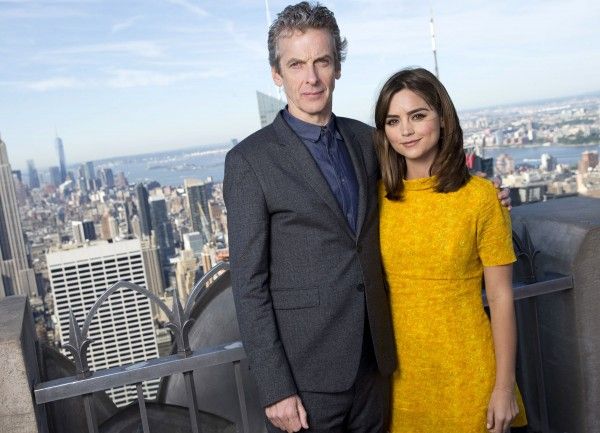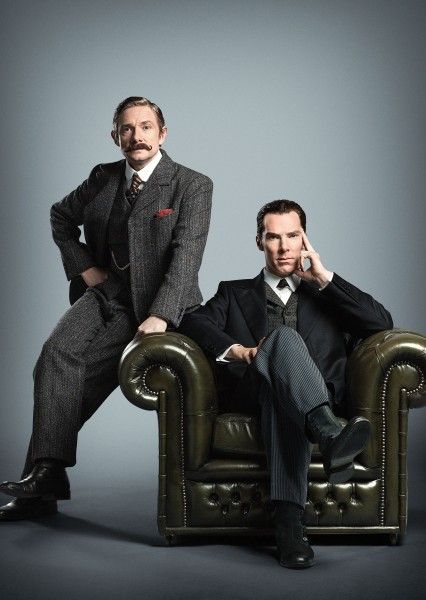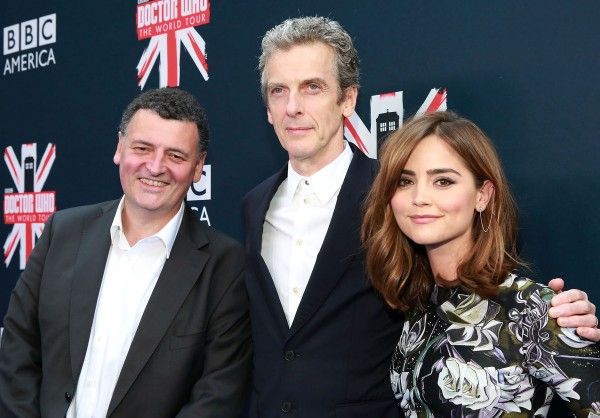As the showrunner of both Doctor Who, which returns to BBC America on September 19th, and Sherlock, which returns “soon-ish” to Masterpiece on PBS, Steven Moffat is one very busy guy. In Peter Capaldi’s second season at the helm of the TARDIS, Doctor Who will see the Doctor and Clara Oswald (Jenna Coleman) going on a journey that takes them to deadly alien planets, creepy underwater bases, Viking villages, a global Zygon uprising and through hidden alien dens, to the very end of time itself. And then, on the Sherlock special, you’ll get to see Sherlock Holmes (Benedict Cumberbatch) and Dr. Watson (Martin Freeman) in the Victorian era of the Sir Arthur Conan Doyle stories.
During this exclusive interview with Collider, Steven Moffat talked about why there could never be a cross-over with Doctor Who and Sherlock, writing for a second season with Peter Capaldi as the Doctor, why Maisie Williams was a clever casting choice for her Doctor Who character, the fun of setting a Sherlock story in the Victorian era, finding a way to incorporate the female characters that were never very present in the Doyle stories, and where they’re at with Season 4.
Collider: Are you surprised that people seem to always want to know about the possibility of a cross-over between Doctor Who and Sherlock?
STEVEN MOFFAT: That’s a question that I get asked so often, and I can’t keep answering it. It’s all right for Doctor Who. That’s fine. But it would change Sherlock’s life, if he met the Doctor and knew that time travel was possible. He’d have to factor that into every crime he solved. And do we really think that Sherlock Holmes lived through a Dalek invasion? I don’t think he did. I think he’d have mentioned it by now. It’s not going to happen. That’s just the truth of it.
What do you think they’d each think of each other?
MOFFAT: I suspect it’s a bit like when the Doctors meet. It’s fantastic, at the beginning, and then you think, “What the hell am I going to do with three of the bastards?” It’s just weird. You don’t really need more than one person like that in a show.
Now that you’ve done a season of Doctor Who with Peter Capaldi, does it change your process of writing it, once you’re settled in with who you’re writing for?
MOFFAT: A bit, but in ways that you don’t really think about, day to day. I just know it’s Peter now, and his voice rather than Matt Smith’s is in my head. That’s a slightly slow transfer ‘cause you’ve got nothing to write, at the beginning. It was the same when it went from David [Tennant] to Matt. You just write for David for awhile and see what Matt does with it, and then you make it him. That’s all you can really do.
What can you say about what we can expect from Maisie Williams’ appearance on the show?
MOFFAT: I can’t really talk that much about it because I don’t want to give too much away. It’s a clever casting choice, and not mine. It was (executive producer) Brian Minchin’s very clever idea. You’ll see why she’s an interesting choice for what she ends up doing.
The upcoming Sherlock special is very different from what we’ve come to know Sherlock to be. How did the idea to do a Victorian-set story come about?
MOFFAT: We have our modern version, and we’re very pleased with our modern version. As a running joke, we’d always said, “Should we try to get them into Victorian gear for a scene? Should we do a wee dream sequence, or have them go to a party?” I remember when we were shooting the little prequel for Series 3, Mark [Gatiss] was doing second unit on it and I was hanging out with him ‘cause we hang out. We had a laugh and said, “Could we do it just once?” And then, as we talked, we just thought, “If we’re gonna do it, we have to just do it. We’ve never explained why he’s in the modern day, so why should we have to explain why he’s not.” So, we went to Sue [Vertue] and said, “It can’t be part of the series. It can’t be one of the three. That’s silly, somehow. That would take away from the show. But, let’s do one extra one.” This is an extra. It wasn’t asked for. We volunteered it and said, “We’ll do one special, and we’ll do it according to Doyle. We’ll do it as the Victorian version just once, to see what it’s like.” I don’t think it’s unfair – and maybe it is, but I’ll say it anyway – to say that we’ve got the Sherlock Holmes and Dr. Watson of the era. These are the ones. These are the guys. So, it’s nice to see them do it in the proper gear. We also like the fact that the only other pairing who have done it both contemporary and Victorian were [Basil] Rathbone and [Nigel] Bruce. They did both. So, it’s just nice to think that Benedict [Cumberbatch] and Martin [Freeman] have done it too.
If Sherlock were a show that you could everybody together to have seasons that were done more regularly, would this special ever have existed?
MOFFAT: I don’t know. I’m surprised that we did it. Because of the strange nature of our show, which wasn’t particularly intentional – it’s just the way it worked out – we do three, every so often, with long gaps. Somehow it feels more right just to have a one-off special, sitting by itself and unconnected. Sherlock never feels like it just comes back for that year. It re-enters the stadium with a big blast for a very, very short time, and then buggers off again. In its weird rock star preening, it feels right.
Would you ever have done a Christmas special, or was it always a Victorian special that you wanted to do?
MOFFAT: It is a Christmas-ish special. It will be around that time of year. I’m not being vague because I’m evil. I just don’t know. It won’t be Christmas day ‘cause that’s too crowded now, but it will be somewhere around that period. So, it’s a sort of Christmas special. We keep calling it the Christmas special, and there’s a Christmas-y element in it, but it’s not really. You could put it in the middle of summer and it would be fine.
Were there any characters that were particularly difficult to translate into this time period?
MOFFAT: That’s the interesting thing, and you’ll see how we tackled that. All the women because they don’t speak. Mrs. Hudson doesn’t speak in Doyle’s version. Mary gets one story, in which she doesn’t feature very much, and then never speaks again except when she gets her husband’s name wrong in another story. The women don’t do anything. And Molly Hooper doesn’t exist. We tend to forget that we actually invented a version of Mrs. Hudson that we now think is in the stories, but she’s nothing like that in the stories and she doesn’t speak. And we think of Molly Hooper as if she’s always been there, but she hasn’t. She’s not even there. The trouble with Doyle’s wonderful stories is that he didn’t think he wrote women very well, so they tend not to appear. We’ve got quite a few prominent female characters, and you’ll see what we did with them.
Where are you at with the development of more Sherlock? Are there any other scripts written already?
MOFFAT: No. Mark will be starting very soon. He may have started. I’ve got to finish my Doctor Who Christmas special, and then I’ll be straight onto Sherlock after that. We haven’t started, but we’ve planned. We know what we’re doing. Haha. Or we think we know what we think we’re doing. There are a couple of things we’ve got lined up that are really quite strong surprises, but we’ll see.
Will you shoot that this year?
MOFFAT: I think we’re shooting next year, April-ish.
Doctor Who airs on Saturday nights on BBC America, and the Sherlock special will air on Masterpiece on PBS “Soon-ish.”

